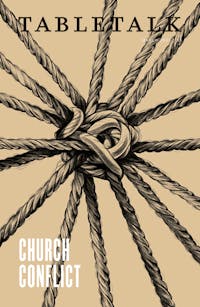
Request your free, three-month trial to Tabletalk magazine. You’ll receive the print issue monthly and gain immediate digital access to decades of archives. This trial is risk-free. No credit card required.
Try Tabletalk NowAlready receive Tabletalk magazine every month?
Verify your email address to gain unlimited access.
Confrontation is rarely, if ever, pleasant, but it is often needful. In 1 Corinthians 11:18–19, the Apostle Paul finds it most needful to confront the Corinthian church about the divisions and factions that are running rampant among them:
For, in the first place, when you come together as a church, I hear that there are divisions among you. And I believe it in part, for there must be factions among you in order that those who are genuine among you may be recognized.
When sin is confronted and conflict results, there is opportunity for repentance and reconciliation. When sin goes unchecked because conflict is avoided, sin and unbelief are allowed to endanger the church. The Apostle Paul instructs Titus to confront false teachers in the churches of Crete in Titus 1:10–13:
For there are many who are insubordinate, empty talkers and deceivers, especially those of the circumcision party. They must be silenced, since they are upsetting whole families by teaching for shameful gain what they ought not to teach. . . . Therefore rebuke them sharply, that they may be sound in the faith.
The Greek word for “rebuke” has a range of meanings: to “expose,” “convict,” “reprove.” The word is also found in Ephesians 5:11, where the Apostle Paul gives instruction about confronting darkness: “Take no part in the unfruitful works of darkness, but instead expose them.” When exposure takes place, conflict is sure to result.
Conflict is most necessary for the church to remain a true church, faithful to the gospel. When error is confronted as in 1 Corinthians 11, genuine Christian faith is preserved. Paul states in verse 19, “For there must be factions among you in order that those who are genuine among you may be recognized.”
Although the word “conflict” is not found in verse 19, Paul is confronting those who are promoting heresies and causing divisions in the church, and needful conflict is often the result. It is needed to preserve the purity of the gospel and to distinguish genuine believers from those who are not. When factions (teachers of heresy) are confronted in the church, those who are true believers and genuine followers of Christ are recognized.
In Galatians, Paul confronted the errors of the Judaizers head-on, and the resulting needful conflict preserved the souls of many from the deluding enticements of another “gospel,” which was no true gospel at all. Those who taught that circumcision is necessary for salvation were destroying the true gospel of grace and were not to be considered genuine believers. He writes in Galatians 1:6, “I am astonished that you are so quickly deserting him who called you in the grace of Christ and are turning to a different gospel.”

Over and over again, throughout the history of the church, needful conflicts have served the purpose of preserving the purity of the gospel. In the first century, needful conflict confronted the Judaizers and preserved the gospel of God’s redeeming grace from the error of works-righteousness. In the early fourth century, needful conflict confronted the errors of the Arians and the doctrine of Christ’s full divinity was preserved. In the early fifth century, needful conflict preserved the sovereign nature of God’s grace as Augustine confronted Pelagius. In the Reformation, needful conflict confronted many errors that had crept into the life of the church during the Middle Ages, including the corruption of worship, the sacraments, the role of the clergy, and the gospel itself.
These errors had to be confronted, and as a result, major conflicts erupted in the church. Many godly men lost their lives. Yet these conflicts were most needful to restore the church to spiritual health and vitality. As these errors were confronted and as godly men pressed through the conflicts, the true church was preserved, and those who were not genuine believers were exposed.
Conflicts may be unpleasant, but they are needful if we are to be faithful to Christ and seek to preserve the purity of His church. May God give us wisdom that we may discern when confrontation is needed and how to navigate the resulting conflicts in such a way that Christ is honored and His church preserved.
